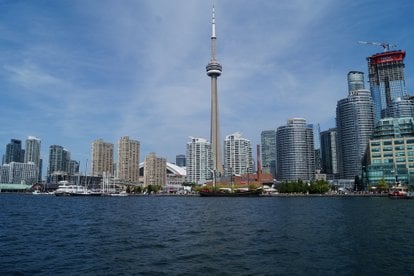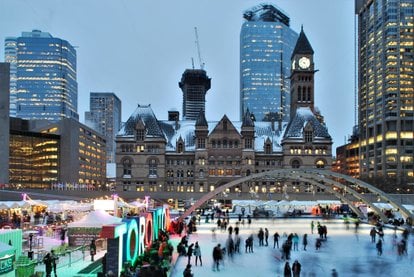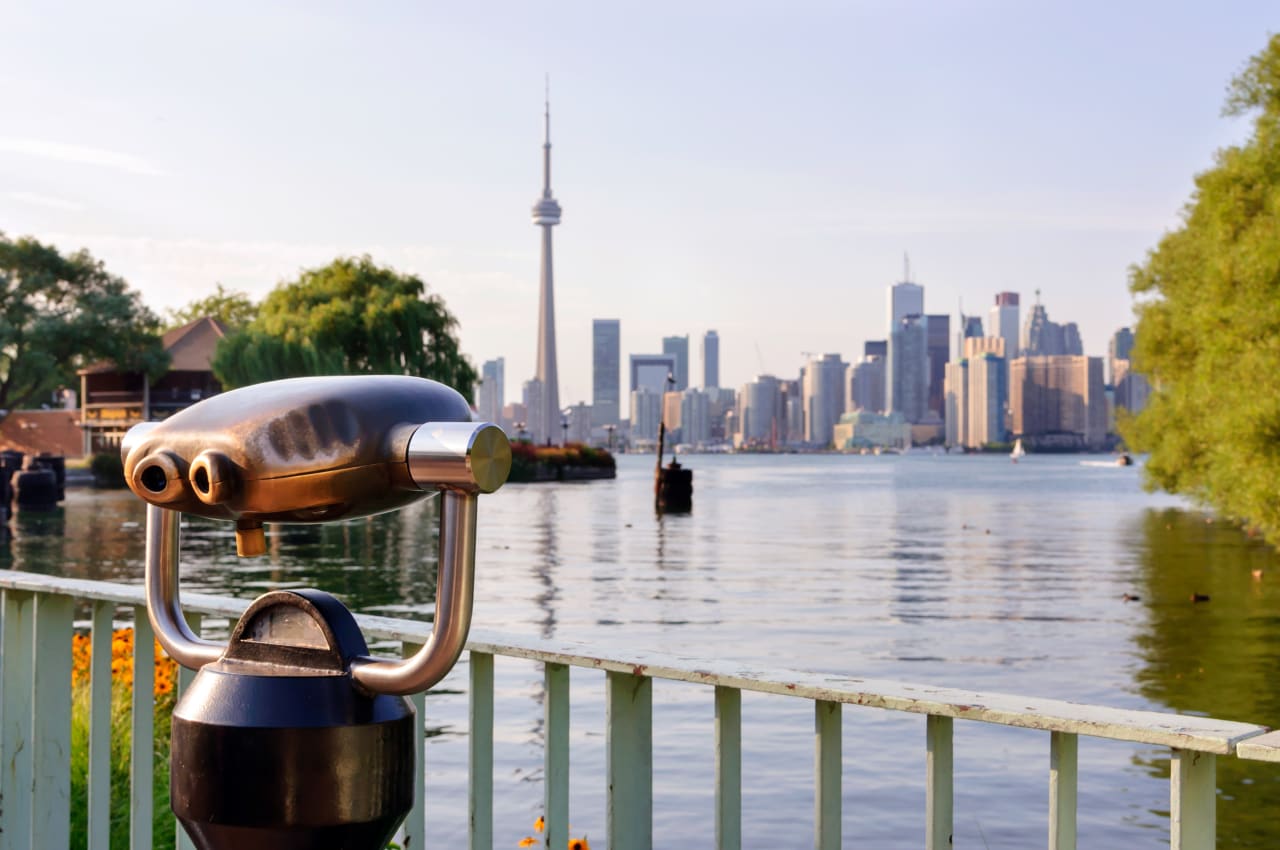
Best time to visit
87 things to do in Toronto
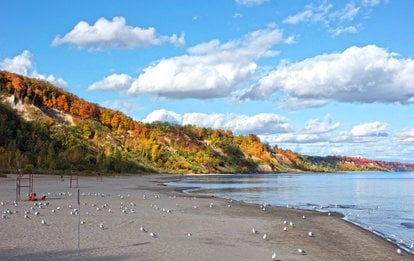
Autumn
While the beginning of the season is still quite warm and sunny, November may see the first frosts and snow
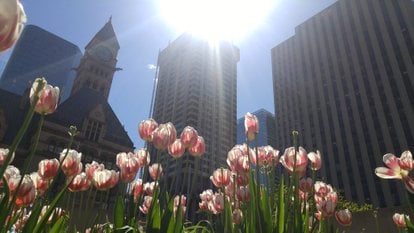
Spring
The weather is rather unpredictable. Arctic cold winds in March are replaced by sunny warm weather in May
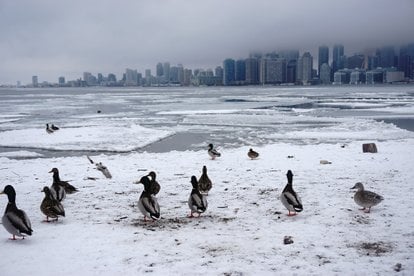
Winter
Toronto might be warmer than other parts of Canada but winter still brings lots of snow and frost

Toronto Caribbean Carnival or Caribana
Toronto invites lovers of Caribbean culture to the largest North American street festival of colorful traditions

Hockey Season
The Toronto Maple Leafs are legendary: every game is a sensation, every move is epic

Ice Skating
Enjoy this favorite winter activity at one of Toronto's most famous outdoor ice rinks

Santa Claus Parade
As winter approaches Toronto, Santas arrive to the city with the accompaniment of bright floats and marching bands
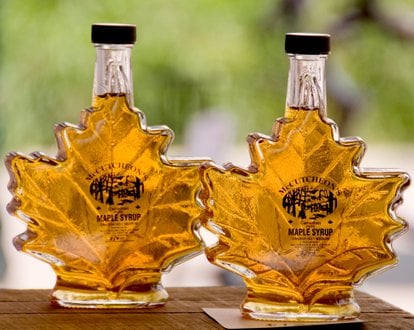
Fresh Maple Syrup
This iconic Canadian topping is made of maple sap collected from tree trunks—what a generous gift from nature!

Toronto Marathon
Every year 15,000 people from over 50 countries visit Toronto driven by a common passion for running

First Light
After visiting 17th century Ontario, you'll see that such a life could be quite fun even without electricity and light bulbs

The Path
World's largest underground sale takes place along a 30-km PATH winding under Toronto

The Gibraltar Point Lighthouse
Canada's first lighthouse is still haunted by the ghost of its first caretaker
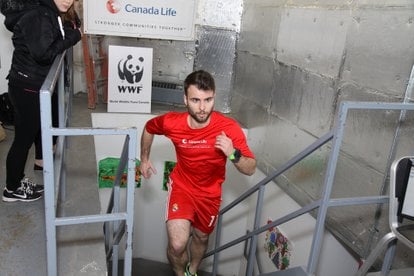
CN Tower Climb
When you climp up 1,776 stairs, you'll be at the highest man-made point in Canada

Summer Tour Around Weird Houses
A couple of eccentric houses are both amusing and scary
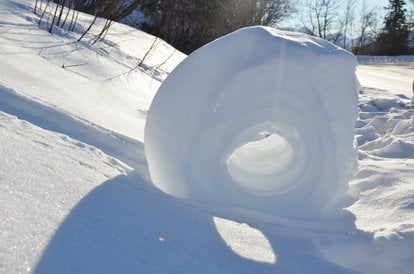
Snow Rollers
These huge white 'doughnuts' surely raise questions. Like, what is a 'snow roller' and where does it come from?

Canada’s Wonderland
If your life needs a bit more thrill, the rollercoasters of Canada's Wonderland are perfect for you!

Luminato Festival
About 10,000 artists from 40 countries, and a million visitors—the scale is impressive as is the art!
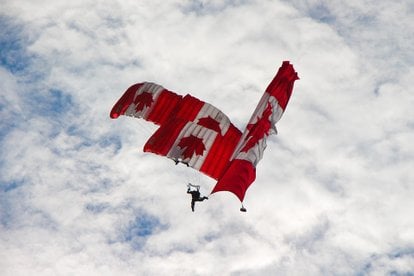
Canada Day
This national holiday is a great occasion to see Torontonians paint the town red, the city-wide firework party and fireworks start after dusk

CN Tower Edge Walk
How do you feel about heights? What about a free-hand walk on the edge of one of the world's highest buildings?

Skiing and Snowboarding in Toronto
Steep and gentle slopes, snowboard terrain parks, and a tubing field—ski resorts around Toronto have tons to offer

Victoria Day Fireworks
The sky is brightened with a 14-minute display of dazzling fireworks—all for Her Majesty

Public Gardens Abloom
Tulips, roses, cherry blossoms, butterflies, and chirping birds—spring turns a large part of Toronto into paradise

Woofstock Festival
About 150,000 animals compete in contests, partake in fashion shows, indulge in doggy delicacies, and simply have fun

World Poutine Eating Championship
Over three kilos of steaming poutine are eaten in minutes for a prize of $5,000
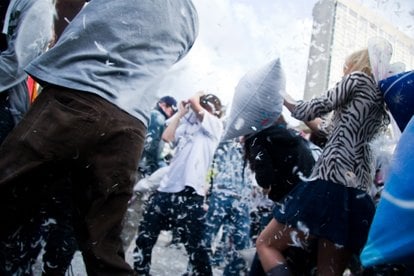
Giant Pillow Fight
A pillow warrior lives inside each of us, and it's time to let him out for battle!

TIFF or Toronto International Film Festival
Film stars and fans from the planet's corners gather in Toronto for one the world's biggest film festivals

Doors Open Toronto
A unique chance to discover the real city that is typically hidden from visitors
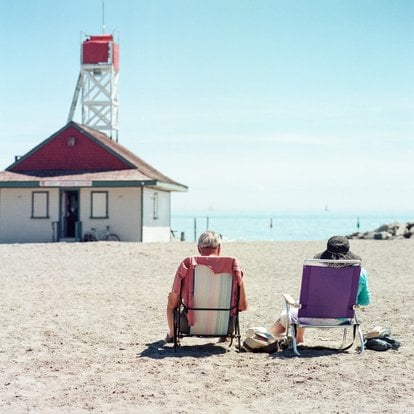
Beach Season
Either an ordinary beach or a nude one for a change—the decision is entirely up to you

Halloween in Toronto: Parades, Festival & Events
Experience the dread of Toronto's monsters that rise from the ground on Halloween night

Lower Bay Station
This bricked-over, abandoned subway station can still be reached via a secret gateway

Black Creek Pioneer Village
This open-air museum shows Canada as it was two centuries ago
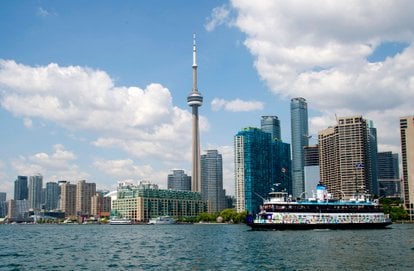
Boat Cruises
Explore the waters surrounding Toronto, and you will discover amazing city landscapes and islands
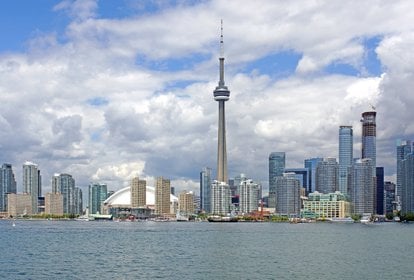
CN Tower
Canada's tallest structure and Toronto's favourite landmark offers unbeatable panoramic views of the city

Taste of the Danforth
Enjoy the flavour of Greece at Canada's largest street festival

Toronto Light Festival
The largest art festival in Toronto brightens up winter

Redpath Waterfront Festival
This carefree, fun event is all about entertainment and huge installations

ImportFest
The largest car show in Canada and a must-see for all automotive enthusiasts

Toronto After Dark Film Festival
A showcase of horror, sci-fi, thriller, action and cult cinema

Cask Days
Choose between 400 varieties of beer and cider in three days at one of the largest cask festivals in the world

Pride Toronto
One of the largest Pride celebrations in the world is attended by over 1 million people

Canadian International Air Show
The aviation extravaganza showcases the best aerial acrobatic jet teams on the continent
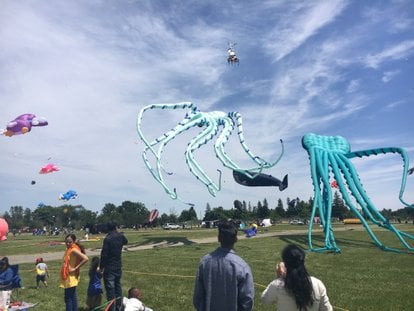
Brampton Kite Fest
Eco-friendly event that celebrates Canadian multiculturalism

The Karma Cup
The largest cannabis products expo and competition in Canada

CBC Music Festival
A perfect day full of music, great food, and activities at Toronto's RBC Echo Beach

Toronto Food Truck Festival
One of the biggest summer food festivals in Toronto

Canadian International AutoShow
Canada's largest and most popular car event

Canadian National Exhibition
The fifth largest fair in North America provides lots of traditional entertainment

Cavalcade of Lights
Thousands of sparkling lights, live music, fun skating and festive fireworks

York-Durham Heritage Railway
A wonderful excursion aboard an old train through some of the most beautiful landscapes in Ontario

Winter Stations
Art installations transform Toronto public beaches during the cold season

The Royal Agricultural Winter Fair
The largest agricultural indoor event in the world

Toronto Ukrainian Festival
The largest Ukrainian Festival in North America

The Distillery Winter Village (Toronto Christmas Market)
Get in a festive mood and shop for gifts at a beautiful outdoor Christmas market in Toronto

Toronto Fringe Festival
The largest theatre and performance festival in Ontario

Canadian Music Week
A seven-day experience for industry professionals, artists, and music fans

Toronto's Festival of Beer
Take three days off to discover your favorite beer

Dreams Festival
Dance to the beats of electronic music on the shores of the Lake Ontario

Lumière: The Art of Light (Winter Light Exhibition)
A free festival celebrating illuminated exhibits at Trillium Park of Ontario Place

Barrie Winterfest (Hello Winter Festival)
One of the most popular winter events in Ontario
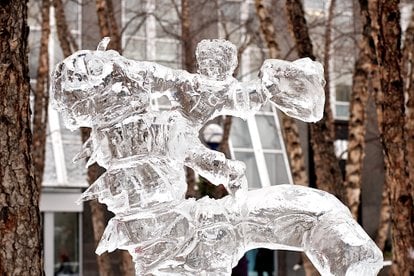
Bloor-Yorkville Icefest
Toronto’s central cultural district turns into a magic world of ice sculptures

Chinese New Year in Toronto
Join one of the largest celebrations in Canada

St. Patrick’s Day Celebration
The largest Irish-themed event held in Toronto

Reebok Ragnar Niagara
This 300-kilometer relay will take you through the most beautiful places along the Lake Ontario shoreline

Cherry Blossom
Experience the fleeting beauty of cherry blossoms in Toronto, where delicate pink petals light up the city each spring

Easter
To mark the feast, Toronto hosts a huge Passion Play, the world's largest Easter parade, and countless egg hunts

Art Toronto
The only international fair for modern and contemporary art in Canada

Beaches Jazz Festival
One of Canada's largest free festivals featuring diverse music genres

Kitesurfing & Windsurfing
Great Lakes of Ontario are perfect for wind sports

Ice Tsunami
Surreal walls of broken ice occasionally pile up on lake shores
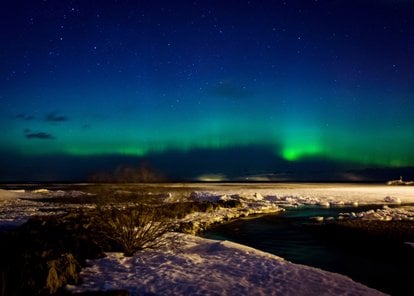
Northern Lights
The magical phenomenon can be just a short drive away from Toronto

Fall Foliage
Toronto is one of the best places in the world to enjoy fall foliage

Canada's Wonderland Winterfest
Watch how this summer event transforms into a winter wonderland!

